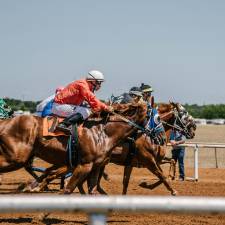by CL Cimino
Around the world, horse racing is considered to be more than just a spectator sport. Rather, it's a longstanding cultural tradition where rituals, codes of conduct, and presentation are just as important as the actual races themselves. If you're heading to the glitz and glamour of the Grand National for the first time this year, a rudimentary understanding of horse racing etiquette will go a long way helping you get the most value out of the experience. Whether you're a dashing gentleman or a refined lady, here are the absolute essentials of horse racing etiquette that you need to be aware of.
1. Dress Code
Perhaps the aspect that most worries first-time attendees is the dress code. As you may have seen from the photographs of major race events that often make the splash on national newspapers, people tend to dress to impress. That's not to say that you need to go all out and spend the equivalent of a month's rent on a tuxedo. Rather, you can simply follow the basics to ensure that you are appropriately dressed for wherever you will be spending the day.
It's worth noting that different races often stipulate vastly different dress codes. Different rules apply depending on the enclosure you are in. For those in the prestigious Royal Enclosure, all men must wear black shoes with matching socks, a top hat, a tie, and ideally a three-button jacket.
While the Grand National tends to be more accessible, both men and women must still dress smartly. Shorts and jeans are not permitted, nor are trainers. Hats do not have to be worn in all enclosures (check the latest information on what your enclosure stipulates before you go), but sheer or strapless dresses are not permitted. These rules are broadly similar for most major race days, and a venue can refuse entry if you do not look the part. Always do your research beforehand to see what is required.
2. Enclosure Rules and Scheduling
As mentioned, most major horse races, from the Melbourne Cup to the Grand National, have different 'enclosures' where different people must go depending on their ticket or invitation. You may find that each enclosure is subject to varying rules concerning behavior and dress. There will always be a more 'prestigious' enclosure that is often invitation-only, where the strictest rules apply.
The website for the Grand National will have detailed rules about your enclosure, but standard etiquette on behavior, which we will explain shortly, will apply to all. It's also worth mentioning that the scheduling of race days often plays a large role in governing behavior. Horse races typically occur once every half hour, only lasting for a few minutes. The time between these is time to mingle with your fellow racegoers, place a bet, sip some champagne (it is important not to drink too much, too early), and grab a bite to eat. It is important to remember to be back at your enclosure in time for each race starting, as some consider it impolite to arrive halfway through a race.
3. Betting Behavior and General Behavior
Placing bets is a central part of horse racing, one that stretches back hundreds of years. While there are no restrictions on which horses you can bet on and the amount you wish to wager, there are a couple of handy rules regarding behavior whilst betting. First off, discretion and humility are key. It is considered very poor form to brag about how much you have won or to belittle someone whose wager did not go the way they wanted.
While you are welcome to place bets at the kiosks at the Aintree Race Track, those aiming for total discretion may consider using an online platform or app that allows you to place bets on all of the latest horse races in real-time. Such sites will also have lengthy explanations of how horse betting works, including explanations of horse betting odds, to save you having to ask lots of questions to the bookmaker and risk exposing yourself as a newbie.
When you're not placing bets, there are a few additional rules that apply to all races that one should keep in mind. First, never comment on anybody else's dress. Compliments are usually acceptable, within the bounds of good taste, but a mean-spirited remark about someone else's outfit will win you no favours. In addition, do not allow yourself to become visibly intoxicated. Obviously, getting a little bit tipsy is fine, but being hammered at 11 am may see you escorted from the premises. In addition, if you are at a major event like the Dubai World Cup, which regularly attracts the rich and famous, avoid being star-struck. It is considered gauche to approach a celebrity and ask for a photo or autograph, and they may well refuse. Simply observe and enjoy the magical surroundings you are a part of.
While proper etiquette matters, the most important thing is to have fun. The Grand National is always a lighthearted, if glittering, social event, so don't forget to make the most of every second.
Look for more interesting articles in our section on Horse Racing.













